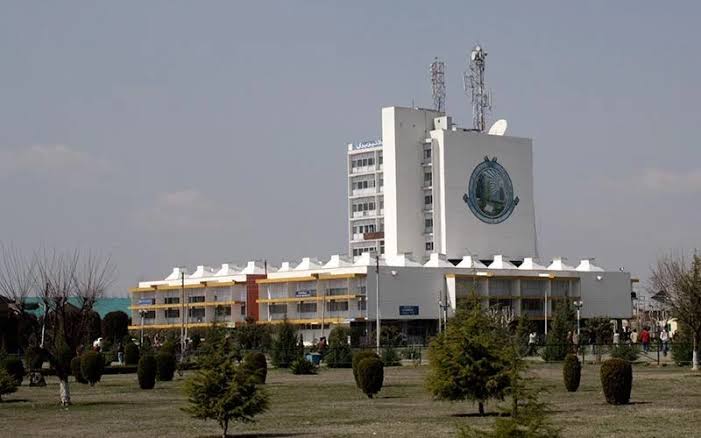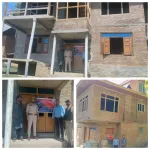Srinagar, June 06: In a landmark achievement for higher education in Jammu & Kashmir, the University of Kashmir (KU) has been awarded the coveted A++ grade by the National Assess-ment and Accreditation Council (NAAC) in its latest re-accreditation cycle. This recognition places KU among the nation’s elite universities, highlighting its academic excellence and institu-tional strength.
The University of Kashmir is the first institution in the Jammu and Kashmir to be evaluated under NAAC’s revised, more rigorous accreditation framework. KU secured an impressive Insti-tutional Cumulative Grade Point Average (CGPA) of 3.68 — the highest in its history — surpas-sing many leading universities across India.
Congratulating the University fraternity, Vice-Chancellor KU, Prof. Nilofer Khan said, “This recognition is a tribute to the collective efforts of our faculty, students, and admin-istrative staff. As the flagship institution of J&K, we are committed to aligning with NEP 2020 and advancing knowledge through cutting-edge research and inclusive educa-tion. From pioneering flexible degree programmes to mobilising over ₹112 crores in re-search grants, this A++ grade strengthens our resolve to become a globally recognised knowledge hub, responsive to challenges of climate change, biodiversity, and society.”
Prof. Khan further noted that during the assessment period, the University prioritised academic calendar restoration, timely conduct of examinations, and adherence to de-gree timelines. A single-window clearance mechanism was introduced to streamline student services, while KU’s strong integration with the National Academic Depository (NAD) ensures secure, digital access to student records, a key component of its digital governance framework.
The NAAC Peer Team, comprising seven expert members (two on-site and five online), conducted a thorough evaluation during their visit from 29 May to 31 May 2025.
Following their review, the Peer Team lauded the University’s research advancement, student-centric environment, upgraded infrastructure, and IT-enabled learning sys-tems. Special appreciation was extended for the University’s forward-thinking imple-mentation of the National Education Policy (NEP-2020), especially initiatives such as the Design Your Own Degree (DYD) programme, and futuristic academic offerings like Artificial Intelligence and Data Science at KU’s Zakura Campus.
The team also praised the University’s use of DigiLocker for seamless access to stu-dent records, and the vibrant entrepreneurial culture fostered through the New Genera-tion Innovation and Entrepreneurship Development Centre (NewGen IEDC) on cam-pus.
A highlight of the accreditation was the Student Satisfaction Survey (SSS), which rec-orded an impressive 78% satisfaction rate, based on OTP-verified feedback on teach-ing quality, mentorship, and academic support.
In individual criterion-wise assessment, the University was evaluated on Infrastructure and Learning Resources, Curricular Aspects, Teaching, Learning and Evaluation, Re-search, Innovations and Extension, Governance, Leadership and Management, Stu-dent Support and Progression, and Institutional Values and Best Practices.
This is the fourth accreditation cycle for the University of Kashmir. It had earlier been awarded Grade ‘A’ in 2002 and 2011, and Grade ‘A+’ in 2019. The current A++ grade signifies a substantial improvement and a firm commitment to academic quality and in-stitutional excellence.
The Peer Team also acknowledged KU’s progressive strides in governance and admin-istration, especially its zero-based budgeting system, strategic fund mobilisation, and decentralised, transparent decision-making as well as automated system at Allama Iq-bal Library.
On the research and innovation front, KU has demonstrated exceptional output with over 3,300 high-quality publications, 22 patents granted, more than 87 grassroots in-novations supported, and research funding exceeding ₹112 crores.
KU also houses two Centres of Excellence – one in Himalayan Biodiversity by UGC and the other in Glaciology by DST – besides a very vibrant Centre for Interdisciplinary Research and Innovations (CIRI), having created a holistic educational and research ecosystem.
Community engagement remains central to KU’s mission. Through outreach pro-grammes like the USHA Silai Schools for Women, menstrual hygiene awareness drives, and urban resilience campaigns, the University is actively strengthening its so-cietal linkages and promoting inclusive development.
With a presence across multiple campuses – including the Main Campus at Hazratbal, Zakura Campus, North Campus at Delina Baramulla, and South Campus at Anantnag – the University offers a robust academic and physical infrastructure. This includes 232 smart classrooms, 186 laboratories, a fully automated Allama Iqbal Library, a world-class Convocation Complex, green campus initiatives, energy-efficient systems, and inclusive facilities for differently-abled students.
This milestone is a result of the collective dedication and hard work of the University’s leadership, faculty, students, scholars, administrative staff, and all stakeholders who have contributed to making the University a nationally recognised institution of excel-lence.








